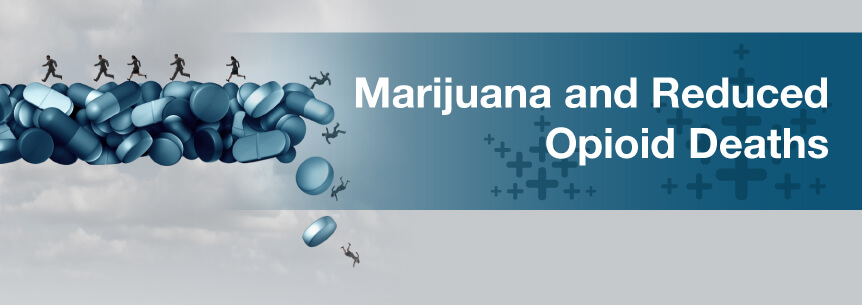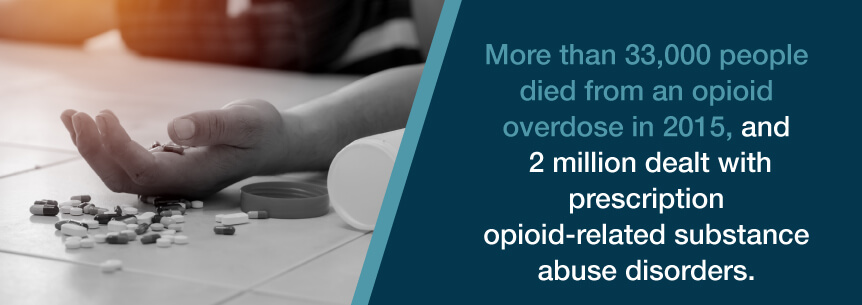
The opioid crisis is one of the biggest public health problems in the United States. Not only can prescription painkillers cause addiction and overdose, but they can also serve as a gateway drug to even riskier substances like heroin. Health officials search for a solution to this epidemic every day — what if that solution was medical cannabis?
A top medical research official has acknowledged that this could be the case. National Institutes of Health Director Francis Collins mentioned the relationship between states with legalized marijuana and reduced opioid overdoses and deaths. He emphasized that we only know it as a correlation and not yet as a causation. But, any acknowledgment of cannabis’ medical potential by federal officials means a lot in a country where marijuana has so many restrictions.
But, if there is a connection going on, how does medical marijuana reduce patients’ dependency on opioids? The answer lies in cannabis’ potency and safety.
In the late 1990s, physicians began to prescribe opioid painkillers at a higher rate. The pharmaceutical companies that produced the medications assured the medical community patients wouldn’t get addicted to their products. But, as we know now, they were wrong.
Fast forward to today — not only are folks becoming addicted to their painkillers, but they’re also moving on to harder drugs. About 21 to 29% of patients who take opioids for pain misuse them, and around 8 to 12% develop an opioid use disorder. While only about 4 to 6% of patients abusing their opioids switch to heroin, 80% of heroin users started out with prescription opioids.

More than 33,000 people died from an opioid overdose in 2015, and 2 million dealt with prescription opioid-related substance abuse disorders. The increase in addiction rates also leads to more neonatal abstinence syndrome, or when a child is born with opioid withdrawal symptoms. With more folks injecting their opioids, more people contract bloodborne diseases like HIV or hepatitis C.
In a nutshell, the opioid crisis is a big problem. By reducing addiction and overdose rates, we can make the United States happier and healthier.
Although opioids can cause so many problems, patients with severe pain don’t have many options. With stronger painkilling capabilities comes possible organ damage, tolerance and addiction. So, discovering a safer alternative for pain relief could give many folks comfort without the risks.
It just so happens that chronic pain is one of the most evidence-supported conditions for medical marijuana treatment, and many states with medical marijuana programs consider it a valid health issue for treatment. Plus, we have plenty of research showing cannabis medicine has great potential as a pain reliever.
In fact, medical marijuana can work just as well as opioids, but without the high risk of addiction. Patients use it for chronic and severe pain from conditions like arthritis, cancer, fibromyalgia and more. Cannabis medicine seems to work especially well for pain related to the nervous system. But, patients with muscle pain also find relief in medical marijuana.
Folks who replace their opioid medicine with medical cannabis don’t have to miss out on relief, because they both work similarly. When you take an opioid medication, it blocks the neurotransmitters in your brain that communicate pain to your body. Medical marijuana activates special receptors in your body that not only reduce pain messages, but also relax muscles and soothe inflammation.
Since medicinal cannabis offers similar benefits to opioids, patients battling addiction can even use it to reduce cravings and withdrawal symptoms.
The federal government is finally beginning to acknowledge medical cannabis’ great potential for reducing opioid addiction. But, have they done anything else about it? While some government officials advocate for medical marijuana as a possible alternative to opioids, not much has happened so far.
In December 2017, Congress members from both major parties wrote a letter about the issue to Health and Human Services Secretary Eric D. Hargan. They cited numerous studies showing medical cannabis could help solve the opioid epidemic. Following up on that evidence, they provided a list of questions requesting details about the government’s efforts to conduct further research on the subject.
Whether the Trump administration will respond to the Congress members’ request is unknown. President Trump declared the opioid crisis a public health emergency in October 2017, but neither he nor his staff acknowledged medical cannabis as a part of the solution.
You may wonder — if the government isn’t doing enough to support medical cannabis as an opioid alternative, what is enough? The answer lies in federal drug laws.
Since federal regulations categorize marijuana as a Schedule I drug, scientists have an incredibly hard time getting any substantial research done. Not only do they have to go through extensive approval requirements to conduct a study, but they only have one resource to get cannabis from. To add even more complications, researchers need existing data to justify their research on marijuana — data that doesn’t exist due to these regulations.
So, the government could improve medical marijuana research by adjusting the drug’s Schedule I status. Changing cannabis to a different drug schedule could lift many limitations on research while still ensuring safety.
To push for the declassification of cannabis, Americans you have many options. You can contact your state representatives about your stance on the subject. Or, you can even talk to your friends and family about common misconceptions about cannabis medicine.
Having reliable resources on marijuana knowledge can also help you advocate for more acceptance. Check out our resource library to learn more about the science, politics and industry of medical cannabis. Be sure to also stay up to date with the latest medical cannabis news on our blog.
No Information on MarijuanaDoctors.Com should be used to diagnose, treat, prevent or cure any disease or condition. You can view our Full Disclaimer here.